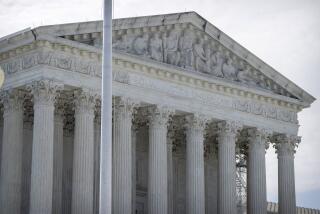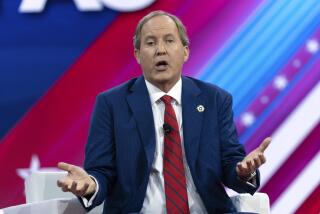Judge strikes down Texas same-sex marriage ban
HOUSTON -- A federal judge in San Antonio overturned the Texas ban on same-sex marriage, ruling that the prohibition is unconstitutional and stigmatizes the relationship of gay couples in the conservative state.
The ruling by U.S. District Judge Orlando Garcia does not allow same-sex couples to immediately marry because he stayed the injunction pending any appeal.
Garcia ruled that the state’s ban deprives same-sex couples of due process and equal protection, stigmatizing their relationships and treating them differently from opposite-sex couples.
“Today’s court decision is not made in defiance of the great people of Texas or the Texas Legislature, but in compliance with the U.S. Constitution and Supreme Court precedent,” Garcia said.
INTERACTIVE TIMELINE: Track rights for same-sex couples
Texas Atty. Gen. Greg Abbott, a Republican campaigning for governor, announced plans to appeal.
The two couples who filed the lawsuit said they were pleased and encouraged.
“We are extremely happy, happy beyond words,” Mark Phariss, 54, a corporate lawyer, and Victor Holmes, 44, a physician’s assistant, said in a statement after the ruling.
The Dallas-area couple, who have been together for about 17 years, were in San Antonio for the ruling and plan to speak at an afternoon briefing with the other couple who filed the lawsuit, Nicole Dimetman, an entrepreneur and marketing consultant, and Cleopatra De Leon, a biostatistician.
Dimetman and DeLeon released a statement saying they “remain hopeful that this matter will continue to move quickly through the courts.”
The Austin couple told the Los Angeles Times that they took legal action in part because they want their 20-month-old son to see them treated equally.
“Ultimately, the repeal of Texas’ ban will mean that our son will never know how this denial of equal protections demeaned our family and belittled his parents’ relationship. We look forward to the day when, surrounded by friends and family, we can renew our vows in our home state of Texas,” they said Wednesday.
In announcing his intention to appeal, Abbott noted that, “this is an issue on which there are good, well-meaning people on both sides. And, as the lower court acknowledged today, it’s an issue that will ultimately be resolved by a higher court.”
“The ultimate decision about Texas law will be made by the Court of Appeals or the U.S. Supreme Court,” Abbott said, adding: “The U.S. Supreme Court has ruled over and over again that states have the authority to define and regulate marriage. The Texas Constitution defines marriage as between one man and one woman. If the Fifth Circuit honors those precedents, then today’s decision should be overturned and the Texas Constitution will be upheld.”
Texas Gov. Rick Perry also released a statement opposing Wednesday’s ruling.
“Texans spoke loud and clear by overwhelmingly voting to define marriage as a union between a man and a woman in our Constitution, and it is not the role of the federal government to overturn the will of our citizens,” Perry said, alluding to a 2005 amendment that was passed in addition to a 2003 law banning gay marriage.
Perry, a Republican, called Wednesday’s ruling “yet another attempt to achieve via the courts what couldn’t be achieved at the ballot box. We will continue to fight for the rights of Texans to self-determine the laws of our state.”
Other same-sex marriage opponents were optimistic that the state will win a reversal with the conservative 5th Circuit Court of Appeals based in New Orleans.
“The Fifth Circuit certainly will get this right,” said Jonathan Saenz, president of the conservative Austin-based advocacy group Texas Values. “They have a habit of correcting federal court judges from Texas that so clearly make decisions that go against established precedent.”
Saenz said the state’s attorneys did a “fantastic job” of defending the ban, and blamed the decision on Garcia being, “an activist judge who seemed to be looking for this outcome from the beginning.”
Some state attorneys general have refused to defend laws banning same-sex marriage.
Last week, Oregon’s attorney general stopped defending the state’s ban in federal court, noting in court filings that the law “cannot withstand a federal constitutional challenge.” That followed similar decisions by counterparts in Nevada and Pennsylvania.
On Tuesday, U.S. Atty. Gen. Eric Holder offered support for those who decline to defend the bans. Speaking to a conference of state attorneys general, Holder acknowledged that officials are required to defend state laws, but said, “I believe we must be suspicious of legal classifications based solely on sexual orientation.”
The legal campaign for marriage equality has been escalating, increasing the likelihood of a Supreme Court test as early as next year.
Since mid-December, prohibitions on same-sex marriage have been ruled unconstitutional in New Mexico, Utah and Virginia by federal judges. The Utah and Virginia decisions have also been stayed pending appeal.
“Judge Garcia has added one more voice to the chorus that is rising around the country, declaring that all citizens have the right to marriage equality,” said Barry Chasnoff, one of the attorneys who represented the Texas couples.
ALSO:
Train hits, kills crew member filming Gregg Allman biopic
What’s in a name? For the wrong Cody Williams, 35 days in jail
Bieber arrest video coming soon, if you’re into that sort of thing
More to Read
Sign up for Essential California
The most important California stories and recommendations in your inbox every morning.
You may occasionally receive promotional content from the Los Angeles Times.











